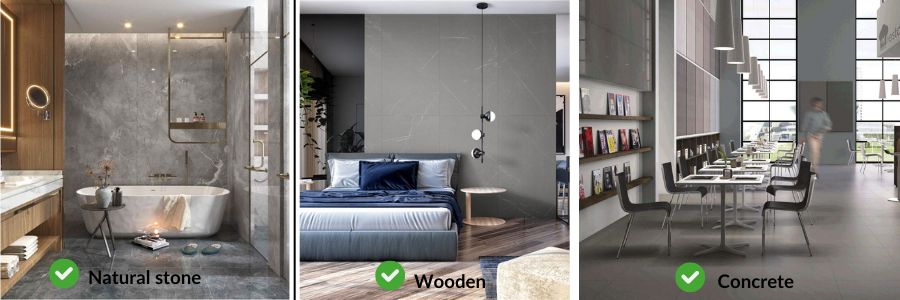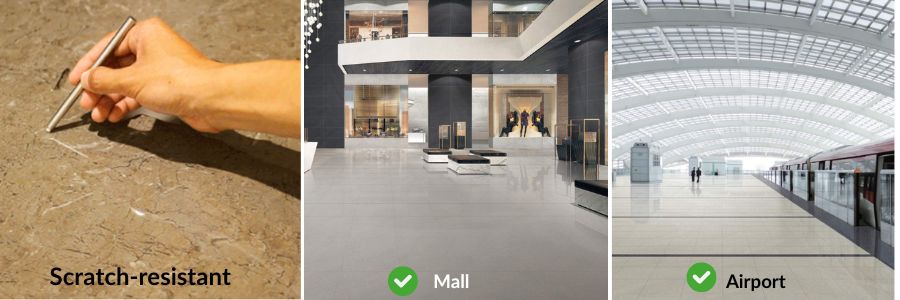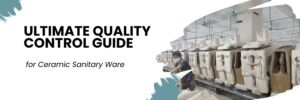In today’s global market, porcelain tiles play a significant role in the construction and design industries, making them a sought-after commodity for importers worldwide. This blog post aims to delve into the advantages and disadvantages of porcelain tiles, offering valuable insights for international importers looking to source high-quality tiling solutions.
Let’s get started.
Why choose porcelain tile?
Porcelain tiles are renowned for their exceptional strength, durability, and versatility. Their dense composition and low porosity make them ideal for various applications, especially for the floor.
Importers favor porcelain tile floors for several reasons, including their durability, aesthetic appeal, and low maintenance requirements. Additionally, porcelain tiles offer a wide range of design options, mimicking natural materials like slate, marble, wood, or concrete with remarkable realism. Importers can capitalize on the versatility of porcelain tiles to cater to diverse market demands and trends, providing customers with premium tiling solutions that elevate their spaces.

Benefits of porcelain tile
Porcelain tiles have several noteworthy benefits that make them an ideal choice for both residential and commercial floor and wall applications.
1. Highly durable and scratch-resistant
Porcelain tile is well known for its exceptional durability and resistance to scratches. This is primarily due to the use of highly refined clay and high-temperature firing during its production. These factors contribute to its denser structure and lower air pockets compared to ceramic tile.
Because of its superior abrasion and wear resistance, porcelain with a high density is a great option for heavy-traffic areas. Whether it’s in a restaurant, supermarket, or airport, porcelain tiles can stand up to the challenge.
Furthermore, the scratch-resistant nature of porcelain tile adds to its appeal. It can withstand damage from dropped objects, furniture movement, and general rough usage, all without leaving a trace. Even after a long time of usage, it still looks new.

2. High breaking strength and hardness
Brittleness is a fatal weakness of ceramic materials, primarily determined by the properties of their chemical bonds and crystal structure. However, porcelain tiles, with their high density and firing temperature, exhibit exceptional breaking strength and hardness in comparison to other types of ceramic tile. As a result, they are less prone to fracturing or sustaining damage when subjected to the same external force.
3. Waterproof, making it suitable for both indoor and outdoor use.
Porcelain tile’s low water absorption rate is one of its biggest benefits, making it a great option for locations where water exposure is a concern. Compared to most other flooring materials, porcelain can withstand dampness and water better because it is practically waterproof.
This feature makes porcelain tile a perfect choice for bathrooms, kitchens, outdoor patios, or any other areas where the tile may be exposed to water regularly.
Moreover, the water resistance of porcelain tiles extends their lifespan in outdoor applications as they are less affected by seasonal weather changes. Their resistance to frost and heat makes them a suitable choice for outdoor areas in various climates. They can endure freezing cold winters and scorching summer heat without cracking, or warping. With their durability under diverse weather conditions, porcelain tiles are a smart investment for both indoors and outdoors.

4. Excellent stain resistance, easy to clean
It should be noted that one key advantage of ceramic tile is their ability to resist stains. Due to their low water absorption rate, spills do not easily permeate the surface, preventing staining. As a result, they are an excellent choice for areas like kitchens and bathrooms where spills are common.
Additionally, porcelain tiles are easy to clean. Dirt and stains stay on the surface, making them easy to wipe away. A simple sweep and mop with a mild detergent are usually enough to keep your porcelain tiles looking fresh and new. For stubborn stains, porcelain tiles can withstand stronger cleaning agents without losing their color or finish.

Disadvantages of porcelain tiles
Despite the numerous advantages of porcelain tiles that make them an attractive choice for various applications, it is essential to consider the full picture. As with all materials, porcelain tiles also have their share of drawbacks. Acknowledging these potential issues will allow for an informed decision that takes into account both the pros and cons. Now, let’s delve into the less appealing aspects of porcelain tiles.
1. More expensive than ceramic tile
Porcelain tends to be more expensive compared to ceramics. The high-quality material and manufacturing processes involved contribute to the higher price tag. This may not be ideal for those on a tight budget.
2. Difficult to install and cut
Due to their dense material composition, porcelain tile installation can be complex and time-consuming, especially if you’re not experienced in tile installation. Since porcelain tile is heavier and has high hardness, it may require some professional tools for cutting and carrying it. This is especially true for intricate designs or large format tiles, which can be challenging to install properly.
3. Potential for peeling off due to low water absorption rate
A significant property of porcelain tile is practically waterproof. Although this feature is generally beneficial, it may cause problems if these tiles are installed on walls. The poor rate of water absorption can prevent the tile from properly adhering to the wall, potentially causing hollow spaces behind the tile or even leading to tile delamination over time.
Having looked at the pros and cons of porcelain tiles, it’s clear that these tiles offer a compelling balance of price, durability, and practicality, despite some challenges. However, to further enrich our understanding and make an informed choice for our flooring or wall applications, we should also consider other options. Let’s now turn our attention to another popular material in the tiling industry: ceramic tile.

Are porcelain floor tiles right for you?
Deciding whether porcelain floor tiles are right for you depends on a variety of factors, including your budget, aesthetic preferences, and practical requirements. If you value durability and longevity in high-traffic areas, porcelain tile offers an excellent solution. They excel in resisting scratches, wear, and are water resistant.
Moreover, their versatility in design, effortlessly replicating the look of natural stone or hardwood, offers an array of stylistic possibilities without compromising on quality.
However, the initial cost and installation complexity should not be overlooked. Those on a tight budget or planning a DIY project might find porcelain tiles challenging, both financially and technically.
In moisture-rich environments, such as bathrooms and kitchens, or in areas exposed to the elements like patios, porcelain’s waterproof qualities and resistance to weather changes make it a superior choice.
Ultimately, selecting porcelain floor tiles is a decision that should balance aesthetic desires with practical considerations. Evaluate the specifics of your space, usage patterns, and personal taste to determine if the investment in porcelain tiles will meet your long-term flooring needs.
Conclusion
In conclusion, porcelain tile offers a blend of durability, aesthetics, and functionality that appeal to importers seeking premium tiling solutions for international markets. By weighing the pros and cons of importing porcelain tile, you can make informed decisions that align with their business objectives and customer needs.
FAQ
Are ceramic tiles better than porcelain tiles?
When comparing porcelain and ceramic tiles, the choice between the two often depends on specific needs and preferences. Ceramic tiles are known for their affordability, wide range of designs, and ease of installation, making them popular for many projects. On the other hand, porcelain tiles offer superior durability, water resistance, and are more suitable for high-traffic areas. Ultimately, the decision between ceramic and porcelain tiles comes down to factors such as location, budget, and desired longevity.
Is polished porcelain tile slippery?
Yes. Because polished porcelain tile has a shiny finish that can sometimes make it slippery, especially when wet. This smooth surface is more prone to being slick compared to other finishes like matte or textured tiles. To address slipperiness, consider using rugs or mats in areas with polished porcelain tile, especially in bathrooms or kitchens where water spillage is common.
Does porcelain tile break easily?
No, porcelain tile is renowned for its durability and strength. When used correctly, it is not prone to breaking. In contrast, ceramic tile may crack or chip under sharp impact or if an object falls on it.




